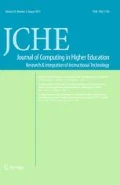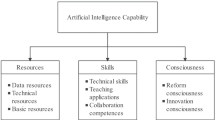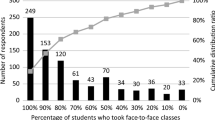Abstract
This paper presents an analysis of learning analytics practices which aimed to achieve personalised learning. It addresses the need for a systematic analysis of the increasing amount of practices of learning analytics which are targeted at personalised learning. The paper summarises and highlights the characteristics and trends in relevant learning analytics practices, and illustrates their relationship with personalised learning. The analysis covers 144 related articles published between 2012 and 2019 collected from Scopus. The learning analytics practices were analysed from the dimensions of what (learning context, learning environment, and data collected), who (stakeholder), why (objective of learning analytics, and personalised learning goal), and how (learning analytics method), as well as their outcomes and limitations. The results show the diversified contexts of learning analytics, with the major ones being tertiary education and online learning. The types of data for learning analytics, which have been increasingly collected from online and emerging learning environments, are mainly related to the learning activities, academic performance, educational background and learning outcomes. The most frequent types of learning analytics objectives and personalised learning goals are enhancing learning experience, providing personal recommendations and satisfying personal learning needs. The learning analytics methods have commonly involved the use of statistical tests, classification, clustering and visualisation techniques. The findings also suggest the areas for future work to address the limitations revealed in the practices, such as investigating more cost-effective ways of offering personalised support, and the transforming role of teachers in personalised learning practices.











Similar content being viewed by others
References
Arnold, K. E., & Pistilli, M. D. (2012). Course signals at Purdue: Using learning analytics to increase student success. In Proceedings of the 2nd International Conference on Learning Analytics and Knowledge (pp. 267–270). ACM
Baker, R. S., & Inventado, P. S. (2014). Educational data mining and learning analytics. Learning analytics (pp. 61–75). New York: Springer
Beemer, J., Spoon, K., Fan, J., Stronach, J., Frazee, J. P., Bohonak, A. J., & Levine, R. A. (2018). Assessing instructional modalities: Individualized treatment effects for personalized learning. Journal of Statistics Education, 26(1), 31–39
Berge, Z. L. (2011). If you think socialisation in mLearning is difficult, try personalisation. International Journal of Mobile Learning and Organisation, 5(3/4), 231–238
Bowers, A. J., Bang, A., Pan, Y., & Graves, K. E. (2019). Education Leadership Data Analytics (ELDA): A White Paper Report on the 2018 ELDA Summit. New York: Columbia University
Bulger, M. (2016). Personalized learning: The conversations we’re not having. Retrieved from https://datasociety.net/pubs/ecl/PersonalizedLearning_primer_2016.pdf
Charitopoulos, A., Rangoussi, M., & Koulouriotis, D. (2020). On the use of soft computing methods in educational data mining and learning analytics research: A review of years 2010–2018. International Journal of Artificial Intelligence in Education, 30(3), 371–430
Chatti, M. A., Dyckhoff, A. L., Schroeder, U., & Thüs, H. (2013). A reference model for learning analytics. International Journal of Technology Enhanced Learning, 4(5–6), 318–331
Cheung, S. K. S., Wang, F. L., Kwok, L. F., & Poulova, P. (2021). In search of the good practices of personalized learning. Interactive Learning Environments, 29(2),179–181
Choi, S. P. M., Lam, S. S., Li, K. C., & Wong, B. T. M. (2018). Learning analytics at low-cost: At-risk student prediction with clicker data and systematic proactive interventions. Educational Technology & Society, 21(2), 273–290
Chou, C. Y., Tseng, S. F., Chih, W. C., Chen, Z. H., Chao, P. Y., Lai, K. R. … Lin, Y. L. (2015). Open student models of core competencies at the curriculum level: Using learning analytics for student reflection. IEEE Transactions on Emerging Topics in Computing, 5(1), 32–44
Colvin, C., Rogers, T., Corin, L., Fisher, J. A., Wade, A., Dawson, S. … Kennedy, G. (2016). Student retention and learning analytics: A snapshot of Australian practices and a framework for advancement. Retrieved from http://he-analytics.com/wp-content/uploads/SP13-3249_-Master17Aug2015-web.pdf
de Freitas, S., Gibson, D., Du Plessis, C., Halloran, P., Williams, E., Ambrose, M. … Arnab, S. (2015). Foundations of dynamic learning analytics: Using university student data to increase retention. British Journal of Educational Technology, 46(6), 1175–1188
Fiqri, M., & Nurjanah, D. (2017). Graph-based domain model for adaptive learning path recommendation. In Proceedings of 2017 IEEE Global Engineering Education Conference (pp. 375–380). IEEE
Gabarre, S., Gabarre, C., & Din, R. (2018). Personalizing learning: A critical review of language learning with mobile phones and social networking sites. Journal of Advanced Research in Dynamical and Control Systems, 10(2), 1782–1786
Gašević, D., Dawson, S., & Pardo, A. (2016). How do we start? State and directions of learning analytics adoption. Retrieved from https://www.icde.org/s/dragan_la_report-cc-licence.pdf
Godwin-Jones, R. (2017). Scaling up and zooming in: Big data and personalization in language learning. Language Learning & Technology, 21(1), 4–15
Hlaoui, Y. B., Hajjej, F., & Ayed, L. J. B. (2016). Learning analytics for the development of adapted e-assessment workflow system. Computer Applications in Engineering Education, 24(6), 951–966
Janzen, D. A., Keyek-Franssen, D., Patria, P., & Sakai, E. (2017). Effectively applying data and predictive analytics to improve student success and completion. Retrieved from https://er.educause.edu/articles/2017/1/top-10-it-issues-2017-foundations-for-student-success
Kalz, M. (2014). Lifelong learning and its support with new technologies. In N. J. Smelser, & P. B. Baltes (Eds.), International encyclopedia of the social and behavioral sciences (pp. 93–99). Pergamon: Oxford
Khalil, M., & Ebner, M. (2015). Learning analytics: Principles and constraints. In Proceedings of EdMedia 2015 – World Conference on Educational Media and Technology (pp. 1789–1799). Montreal, Canada
Kitto, K., Lupton, M., Bruza, P., Mallett, D., Banks, J., Dawson, S. … Siemens, G. (2020). Learning analytics beyond the LMS: Enabling connected learning via Open Source Analytics in “the wild”. Retrieved from https://opus.lib.uts.edu.au/handle/10453/152210
Kravčík, M., Ullrich, C., & Igel, C. (2018). The potential of the internet of things for supporting learning and training in the digital age. In Zlatkin-Troitschanskaia, et al. (Eds.), Positive Learning in the Age of Information (pp. 399–412). Springer
Krumm, A., Means, B., & Bienkowski, M. (2018). Learning analytics goes to school: A collaborative approach to improving education. New York: Routledge
Lan, A. S., Waters, A. E., Studer, C., & Baraniuk, R. G. (2014). Sparse factor analysis for learning and content analytics. The Journal of Machine Learning Research, 15(1), 1959–2008
Lee, L. K., Cheung, S. K. S., & Kwok, L. F. (2020). Learning analytics: current trends and innovative practices. Journal of Computers in Education, 7(1), 1–6
Leitner, P., Khalil, M., & Ebner, M. (2017). Learning analytics in higher education — a literature review. In A. Peña-Ayala (Ed.), Learning analytics: Fundaments, applications, and trends (pp. 1–23). Cham: Springer
Li, K. C., & Wong, B. T. M. (2020a). Trends of learning analytics in STE(A)M education: A review of case studies. Interactive Technology and Smart Education, 17(3), 323–335
Li, K. C., & Wong, B. T. M. (2020b). The use of student response systems with learning analytics: A review of case studies (2008–2017). International Journal of Mobile Learning and Organisation, 14(1), 63–79
Li, K. C., & Wong, B. T. M. (2020c). Personalising learning with learning analytics: A review of the literature. In Cheung, et al. (Ed.), Blended learning: Education in a smart learning environment (pp. 39–48). Springer
Li, K. C., & Wong, B. T. M. (2021). Features and trends of personalised learning: A review of journal publications from 2001 to 2018. Interactive Learning Environments, 29(2), 182–195
Li, K. C., Wong, B. T. M., & Ye, C. J. (2018a). Implementing learning analytics in higher education: The case of Asia. International Journal of Services and Standards, 12(3/4), 293–308
Li, K. C., Ye, C. J., & Wong, B. T. M. (2018b). Status of learning analytics in Asia: Perspectives of higher education stakeholders. Technology in Education: Innovative Solutions and Practices (pp. 267–275). Springer
Liu, D. Y. T., Bartimote-Aufflick, K., Pardo, A., & Bridgeman, A. J. (2017). Data-driven personalization of student learning support in higher education. Learning analytics: Fundaments, applications, and trends (pp. 143–169). Springer
Patrick, S., Kennedy, K., & Powell, A. (2013). Mean what you say: Defining and integrating personalized, blended and competency education. Vienna: International Association for K-12 Online Learning (iNACOL). Retrieved from https://files.eric.ed.gov/fulltext/ED561301.pdf
Piety, P. J. (2019). Components, infrastructures, and capacity: The quest for the impact of actionable data use on P-20 educator practice. Review of Research in Education, 43(1), 394–421
Piety, P. J., & Pea, R. D. (2018). Understanding learning analytics across practices. In Niemi, et al. (Ed.), Learning Analytics in Education (pp. 215–232). Charlotte, N.C.: Information Age Publishing
Pishtari, G., Rodríguez-Triana, M. J., Sarmiento-Márquez, E. M., Pérez-Sanagustín, M., Ruiz-Calleja, A., Santos, P. … Väljataga, T. (2020). Learning design and learning analytics in mobile and ubiquitous learning: A systematic review. British Journal of Educational Technology, 51(4), 1078–1100
Poitras, E. G., Doleck, T., & Lajoie, S. P. (2018). Towards detection of learner misconceptions in a medical learning environment: A subgroup discovery approach. Educational Technology Research and Development, 66(1), 129–145
Ranjeeth, S., Latchoumi, T. P., & Paul, P. V. (2020). A survey on predictive models of learning analytics. Procedia Computer Science, 167(2020), 37–46
Santos, O. C., Kravčík, M., & Boticario, J. G. (2016). Preface to special issue on user modelling to support personalization in enhanced educational settings. International Journal of Artificial Intelligence in Education, 26(3), 809–820
Scott, E., Soria, A., & Campo, M. (2017). Adaptive 3D virtual learning environments – A review of the literature. IEEE Transactions on Learning Technologies, 10(3), 262–276
Shivanagowda, G. M., Goudar, R. H., & Kulkarni, U. P. (2017). CRETAL: A personalized learning environment in conventional setup. In Proceedings of the 10th Annual ACM India Compute Conference on ZZZ (pp. 143–148). ACM
Siemens, G., & Gašević, D. (2012). Special issue on learning and knowledge analytics. Educational Technology & Society, 15(3), 1–2
Tabaa, Y., & Medouri, A. (2013). LASyM: A learning analytics system for MOOCs. International Journal of Advanced Computer Science and Applications (IJACSA), 4(5). Retrieved from https://doi.org/10.14569/IJACSA.2013.040516
van der Merwe, A., du Toit, T., & Kruger, H. (2018). A prescriptive specialized learning management system for academic feedback towards improved learning. Journal of Computer Science, 14(10), 1329–1340
Whale, S., Valenzuela, F. R., & Fisher, J. (2013). Implementing timely interventions to improve students’ learning experience. In ASCILITE-Australian Society for Computers in Learning in Tertiary Education Annual Conference (pp. 908–912). Australasian Society for Computers in Learning in Tertiary Education
Wong, B. T. M. (2017). Learning analytics in higher education: An analysis of case studies. Asian Association of Open Universities Journal, 12(1), 21–40
Wong, B. T. M. (2019). The benefits of learning analytics in open and distance education: A review of the evidence. In M. S. Khine (Ed.), Emerging trends in learning analytics: Leveraging the power of education data (pp. 65–81). Brill
Wong, B. T. M., & Li, K. C. (2020). A review of learning analytics intervention in higher education (2011–2018). Journal of Computers in Education, 7(1), 7–28
Wong, B. T. M., Li, K. C., & Choi, S. P. M. (2018). Trends in learning analytics practices: A review of higher education institutions. Interactive Technology and Smart Education, 15(2), 132–154
Xiao, Y., & Watson, M. (2017). Guidance on conducting a systematic literature review. Journal of Planning Education and Research, 39(1), 93–112
Xing, W., & Du, D. (2019). Dropout prediction in MOOCs: Using deep learning for personalized intervention. Journal of Educational Computing Research, 57(3), 547–570
Author information
Authors and Affiliations
Corresponding author
Additional information
Publisher’s note
Springer Nature remains neutral with regard to jurisdictional claims in published maps and institutional affiliations.
Appendix
Appendix
Rights and permissions
About this article
Cite this article
Wong, B.Tm., Li, K.C. & Cheung, S.K. An analysis of learning analytics in personalised learning. J Comput High Educ 35, 371–390 (2023). https://doi.org/10.1007/s12528-022-09324-3
Accepted:
Published:
Issue Date:
DOI: https://doi.org/10.1007/s12528-022-09324-3




